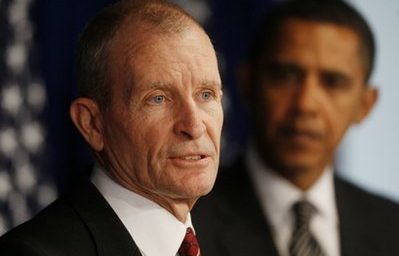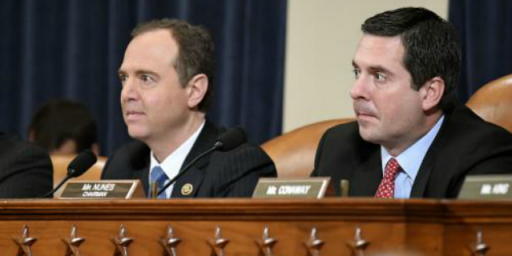British Memo: U.S. Hopes to Cut Force in Iraq in Half by Early 2006
The press have uncovered a secret British memo outlining a substantial withdrawal of British and American troops from Iraq by early next year. Government officials do not deny the memo’s authenticity but say it is only for planning purposes, not an indication of a definitive policy decision.
British Memo: U.S. Hopes to Cut Force in Iraq in Half by Early 2006 (WaPo)
The United States and Britain are drawing up plans to withdraw the majority of their troops from Iraq by the middle of next year, according to a secret memo written for British Prime Minister Tony Blair by Defense Secretary John Reid. The paper, which is marked “Secret — UK Eyes Only,” said “emerging US plans assume that 14 out of 18 provinces could be handed over to Iraqi control by early 2006,” allowing a reduction in overall U.S.-led forces in Iraq to 66,000 troops. The current troop level is about 160,000.
Reid on Sunday did not dispute the authenticity of the document, but said that no decision on troop levels had been made. In Washington, a Pentagon spokesman said officials there had not seen the document.
The undated memo, which was reported Sunday in the newspaper The Mail on Sunday, stated that “current U.S. political military thinking is still evolving. But there is a strong U.S. military desire for significant force reductions to bring relief to overall U.S. commitment levels.”
While top U.S. military commanders and Pentagon officials have been hoping to reduce troop levels in Iraq for some time, the British memo is apparently the first time such a significant reduction has been outlined under a specific timetable. President Bush has refused to set a withdrawal date amid military concerns that such a deadline would allow insurgents to wait out the U.S.-led occupation.
The memo notes a debate between U.S. officials at the Pentagon and military leaders in Iraq, saying that officials in Washington favor “a relatively bold reduction in force numbers,” differing with battlefield commanders, “whose approach is more cautious.” There are more than 135,000 U.S. troops currently in Iraq.
I was certainly surprised if Coalition military leaders weren’t planning for various contingencies. One hopes that a drawdown of that magnitude will be possible once a permanent constitution is ratified and a government elected. One presumes, too, that the Bush and Blair governments would really like that as well. I can’t imagine, though, that they plan to drawn forces down to a level that would be difficult to defend unless the conditions on the ground make that feasible. I am naturally quite skeptical that will be the case within nine months.






My question is: what classified document, what secret memo would be too classified or too secret for a journalist? It’s like journalist has become snitching on every little thing.
When will national security mean something to journalists?
I think that the left either has a hard time understanding the idea of contigency plans or they’re well aware of it, but will use anything they can get their hands on for a “gotcha”, even if they look stupid in the process.
As far as journalists publishing classified documents, I don’t think they really care. If they can hold it up and bash Bush or Blair, that’s all the justification they need. Seems treasonous to me to leak and publish classified documents, but I know you can’t accuse liberals of being treasonous.
My question is: what classified document, what secret memo would be too classified or too secret for a journalist?
Perhaps you should ask right-wing hero David Horowitz who, as editor of left-wing Ramparts magazine in his strident left-winger days in the early ’70’s, published highly sensitive information about satellite codes that was extremely helpful to the Russians.
Now, though he should probably still be in prison, he’s a great icon of the right-wing. Strange, isn’t it?
You people seem to think that reporters are somehow sneaking through our most secure installations, snatching up classified documents like James-frickin-Bond. You do realize, don’t you, that someone with access to that info has to actually _do_ the leaking in the first place, before the reporter ever has to decide whether or not to publish?
I’m not saying reporters have no responsibilities here, but if you’re gonna scold one side of the equation, you might want to look at the other side, too.